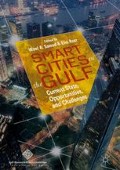Abstract
Cities are projected to accommodate a high majority of human population and also economic activities. Advances in Information and Communication Technologies (ICT) enable significant transformation potential in the way cities are planned and managed. This chapter proposes a holistic impact-driven smart sustainable city (SSC) framework to address social, economic, and environmental issues. The suggested framework defines and encompasses main city constituents and can be used as top-down and bottom-up approach; and may act as a strategic decision-making tool for SSCs as they undertake city-level large-scale complex initiatives. The chapter discusses the application of the suggested impact-driven SSC framework in Smart Dubai, the smart city initiative of Dubai in UAE, as a short case study.
Access this chapter
Tax calculation will be finalised at checkout
Purchases are for personal use only
References
Bureau of Economic Analysis GDP by Metropolitan Area, accessed 12 May 2017 https://www.bea.gov/newsreleases/regional/gdp_metro/gdpmaann_glance.htm
Chourabi, H., Nam, T., Walker, S., Gil-Garcia, J. R., Mellouli, S., Nahon, K.,... & Scholl, H. J. (2012, January). Understanding smart cities: An integrative framework. In System Science (HICSS), 2012 45th Hawaii International Conference on (pp. 2289–2297). IEEE.
Cohen, S. (2013). What do accelerators do? Insights from incubators and angels. Innovations: Technology, Governance, Globalization, 8(3–4), 19–25.
Dhiman, S. (2008). Products, people, and planet: the triple bottom-line sustainability imperative. Journal of Global Business Issues, 2(2), 51–57.
Elkington, J. (1994). Towards the sustainable corporation: Win-win-win business strategies for sustainable development. California management review, 36(2), 90–100.
Environmental Protection Agency (EPA). (2002). Guidelines on the Information to be contained in Environmental Impact Statements.
European Commissions, Directorate General for Regional Policy (EU). (2011). Cities of tomorrow – Challenges, visions, ways forward.
Eurostat GDP at Regional Level, accessed 12 May 2017 http://ec.europa.eu/eurostat/statistics-explained/index.php/GDP_at_regional_level#Regional_GDP_per_capita
Hall, T. J. (2011). The triple bottom line: what is it and how does it work? Indiana business review, 86(1), 4.
Helliwell, J., Layard, R., and Sachs, J. (2017). World Happiness Report 2017.
International Association for Impact Assessment (IAIA). (2007). EIA Follow-Up International Best Practice Principles. IAIA, Fargo, ND, USA.
International Association for Impact Assessment (IAIA). (2012). Impact Assessment. IAIA, Fargo, ND, USA.
International Association for Impact Assessment (IAIA). (1999). Principles of Environmental Assessment Best Practice. IAIA, Fargo, ND, USA.
International Association for Impact Assessment (IAIA). (2015). Social Impact Assessment: Guidance for Assessing and Managing the Social Impacts of Projects. IAIA, Fargo, ND, USA.
KPIs on Smart Sustainable Cities ITU, accessed 12 May 2017 https://www.itu.int/en/ITU-T/ssc/Pages/KPIs-on-SSC.aspx
McKinsey Global Institute (MGI). (2016). Urban World: Meeting the Demographic Challenge.
Organization for Economic Cooperation and Development (OECD). (2013). An International Benchmarking Analysis of Public Programmes for High-Growth Firms. (Prepared by the OECD Local Economic and Employment Development Programme in collaboration with the Danish Business Authority).
Organization for Economic Cooperation and Development (OECD). (2017). Measuring Well-being and Progress: Well-being Research OECD, accessed 12 May 2017 http://www.oecd.org/statistics/measuring-well-being-and-progress.htm
Organization for Economic Cooperation and Development (OECD). (2015). The Innovation Imperative: Contributing to Productivity, Growth and Well-Being. Paris, France.
Smart Dubai Office (SDO). (2017). Smart Dubai 2021 Strategy. SDO, Dubai, UAE.
Sustainable development of communities – Indicators for city services and quality of life ISO, accessed 12 May 2017 https://www.iso.org/obp/ui/#iso:std:iso:37120:ed-1:v1:en
UNECE & ITU. (2016). Striving for Sustainable Development Goals, United 4 Smart Sustainable Cities.
UNHABITAT Global Report on Human Settlements. (2009). Revisiting Urban Planning in the Middle East North Africa Region. New York, NY.
United 4 Smart Sustainable Cities, accessed 12 May 2017 http://www.itu.int/en/ITU-T/ssc/united/Pages/default.aspx
United Nations Department of Economic & Social Affairs (UNDESA) Population Division. (2016). The World’s Cities in 2016 – Data Booklet (ST/ESA/SER.A/392).
United Nations Development Program (UNDP). (2015). Sustainable Development Goals: Introducing the 2030 Agenda for Sustainable Development. New York, NY.
United Nations Department of Economic & Social Affairs (UNDESA) Population Division. (2001). World Population Prospects The 2000 Revision Highlights. New York, NY.
Vanclay, F. (2003). International principles for social impact assessment. Impact assessment and project appraisal, 21(1), 5–12.
Weisbrod, G., & Weisbrod, B. (1997). Measuring Economic Impacts of Projects and Programs: Economic Development Research Group.
Author information
Authors and Affiliations
Corresponding author
Editor information
Editors and Affiliations
Rights and permissions
Copyright information
© 2019 The Author(s)
About this chapter
Cite this chapter
Geray, O. (2019). An Impact-Driven Smart Sustainable City Framework to Address Urban Challenges: Smart Dubai Experience. In: Samad, W.A., Azar, E. (eds) Smart Cities in the Gulf. Palgrave Macmillan, Singapore. https://doi.org/10.1007/978-981-13-2011-8_3
Download citation
DOI: https://doi.org/10.1007/978-981-13-2011-8_3
Published:
Publisher Name: Palgrave Macmillan, Singapore
Print ISBN: 978-981-13-2010-1
Online ISBN: 978-981-13-2011-8
eBook Packages: Business and ManagementBusiness and Management (R0)

